The Many Heads of SPARK
May 3, 2025

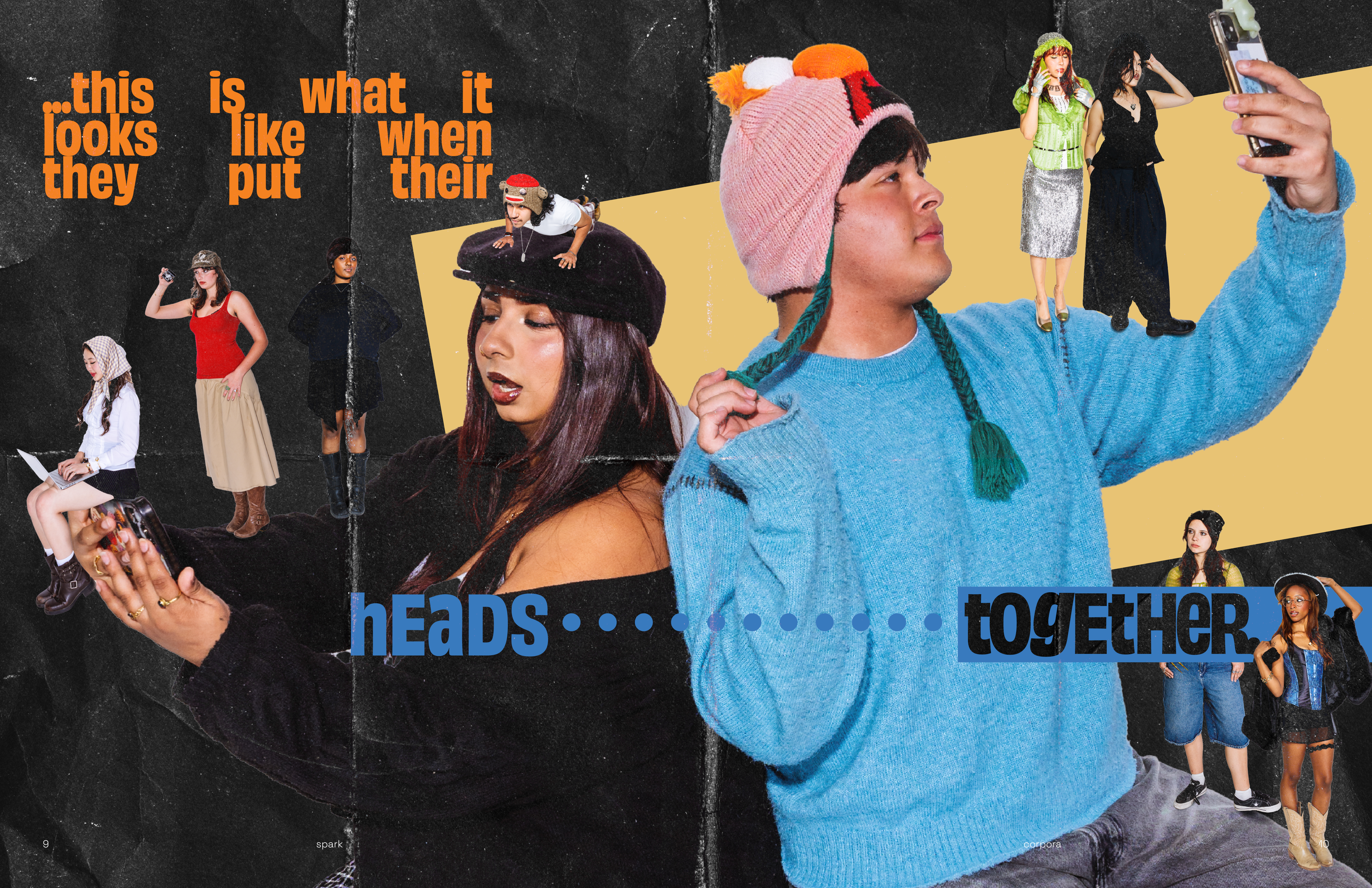
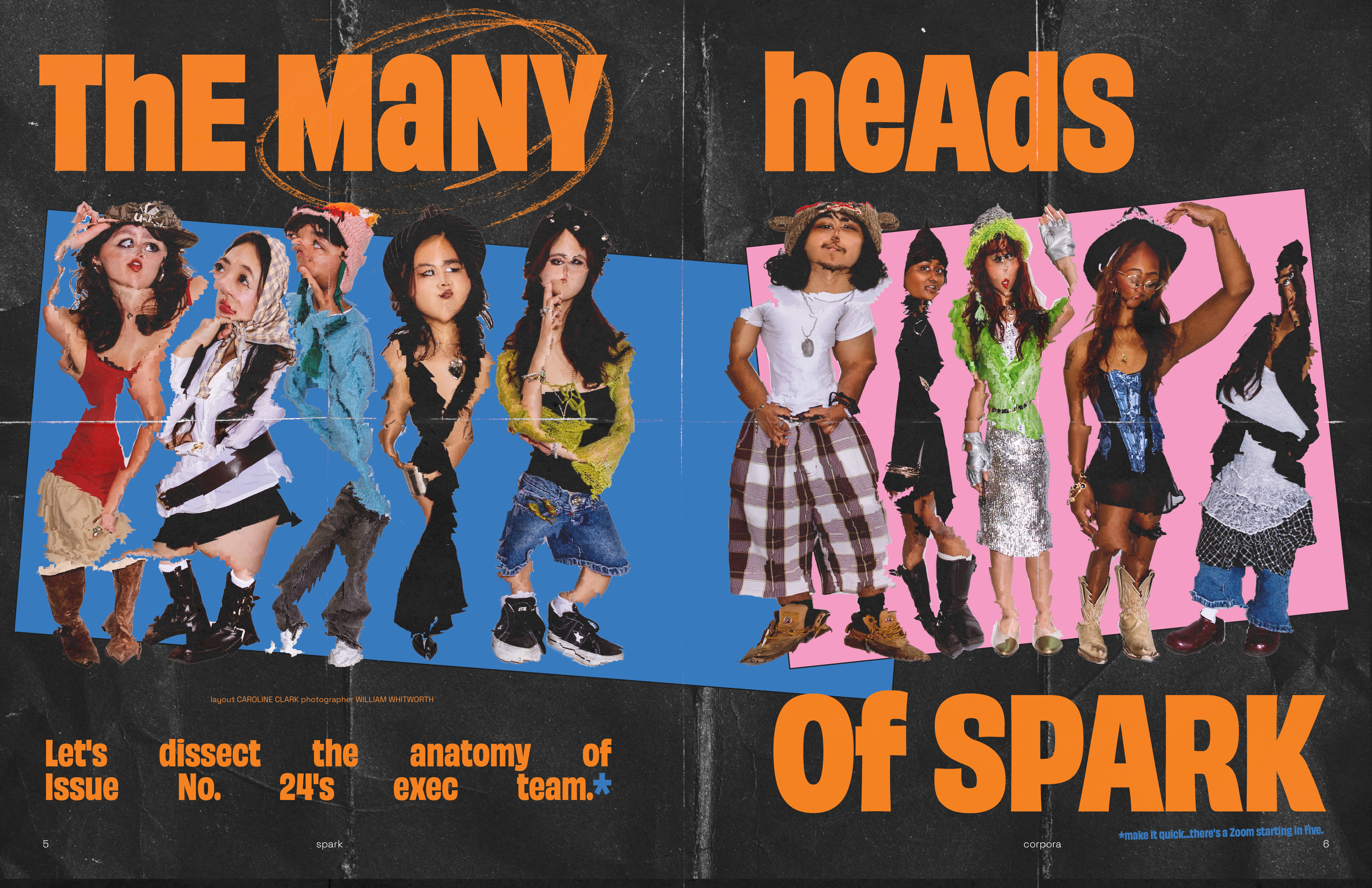
Layout: Caroline Clark
Photographer: William Whitworth
Other Stories in Corpora
Nexus
By Sunshine Zéa Leeuwon
May 3, 2025

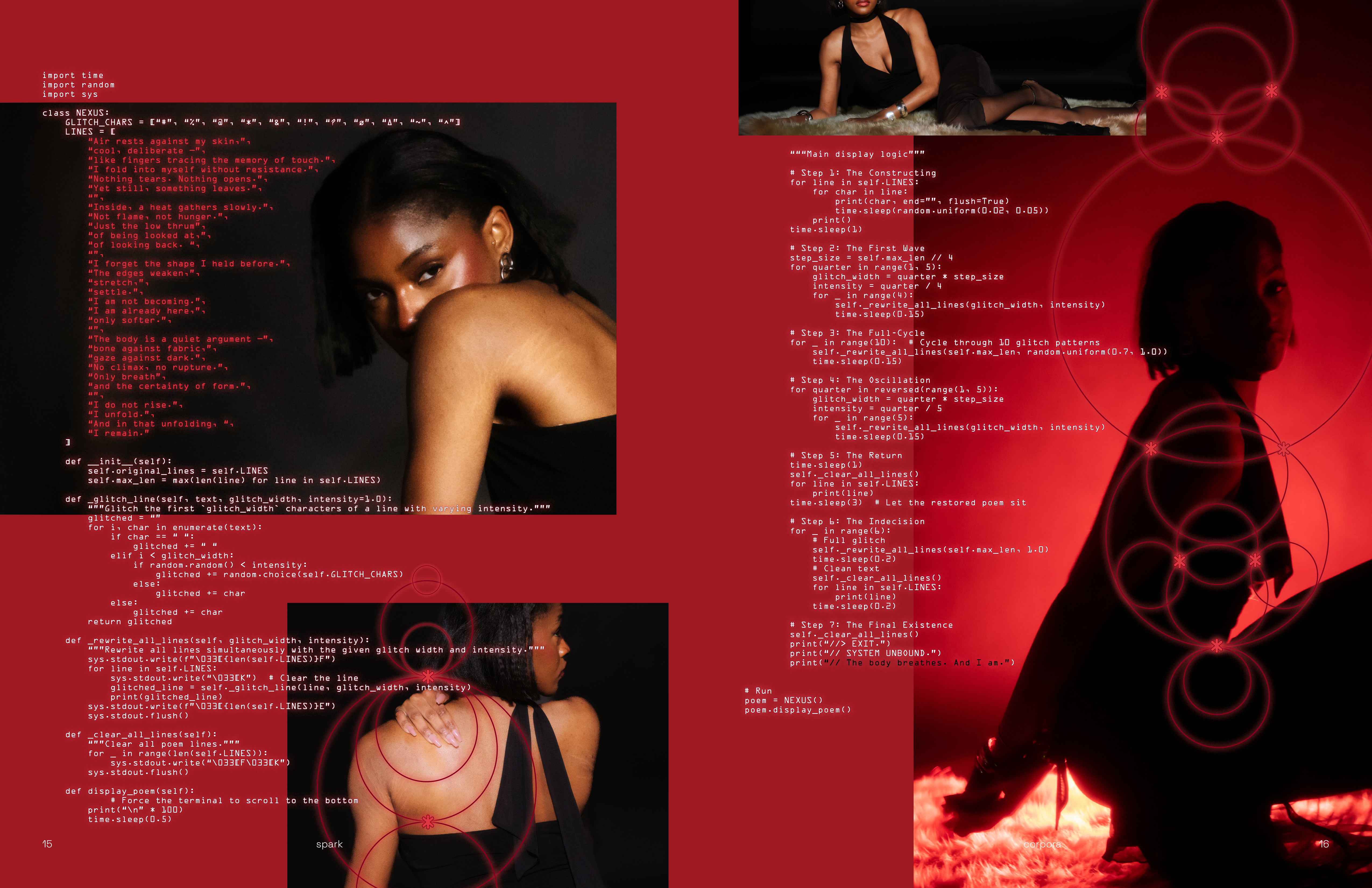


The body breathes, and I am.
Flesh sloughs in ribbons, wet and warm,
pulled slowly from the hollow beneath.
A second mouth yawns where my stomach once was,
slick gums glistening, whispering hunger.
My bones remember weight but not form,
lengthening, twisting, bending inward.
Fingers unspooling into sinew and thread,
knotted tight around my internal pulsing.
Beneath the old shell, a wet bloom shudders,
spine splitting into mirrored spires.
I do not stand, I do not kneel—
I stretch,
I stretch,
I stretch.
The body breathes, and I am. ■
Layout: Melissa Huang
Creative Director: Chase Smyth
Photographer: William Whitworth
Stylists: Chase Smyth & Olivia Birge
Model: Emerald Julius
Other Stories in Corpora
KRONOS.
By Jennifer Wang
May 3, 2025

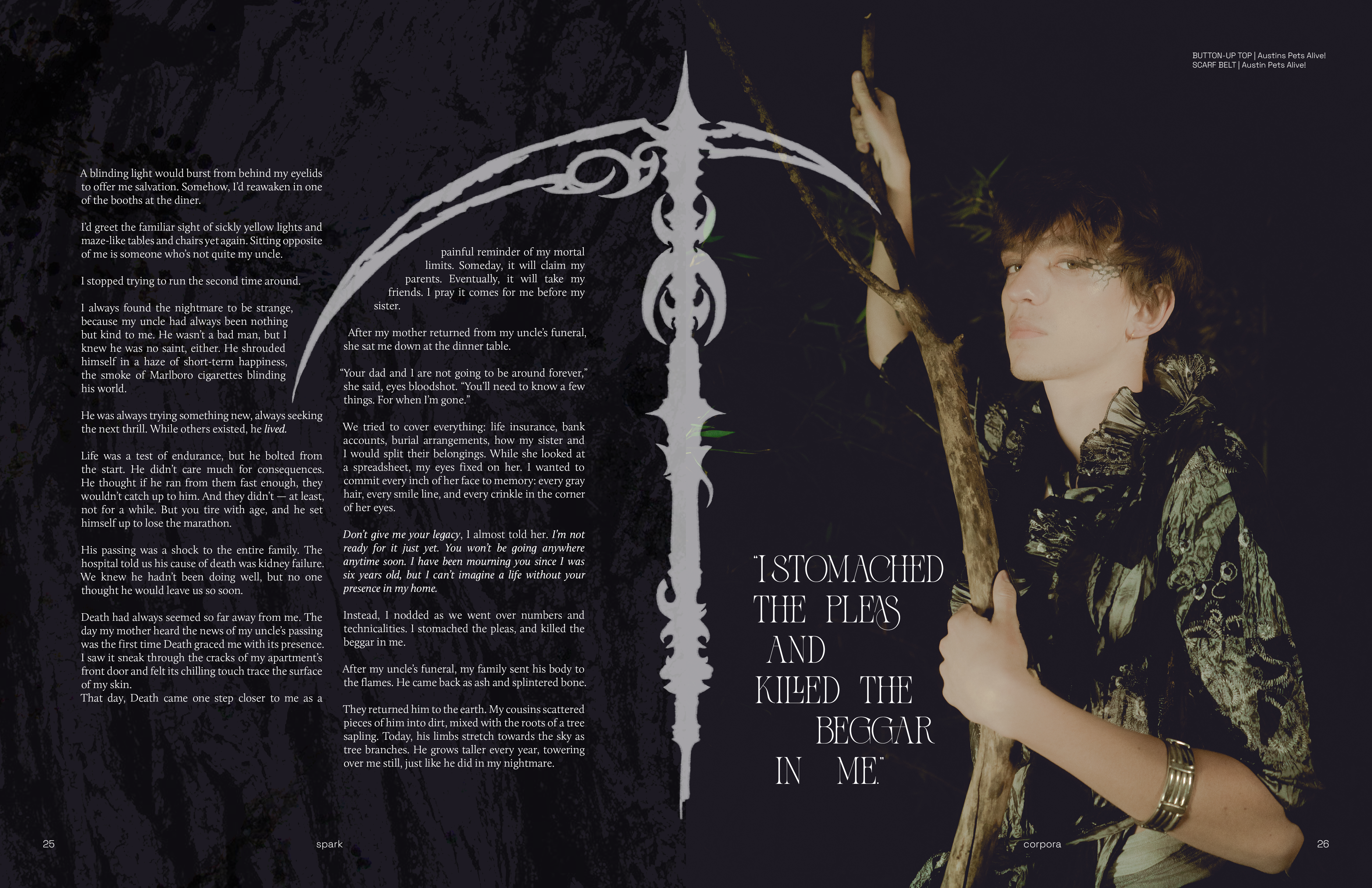
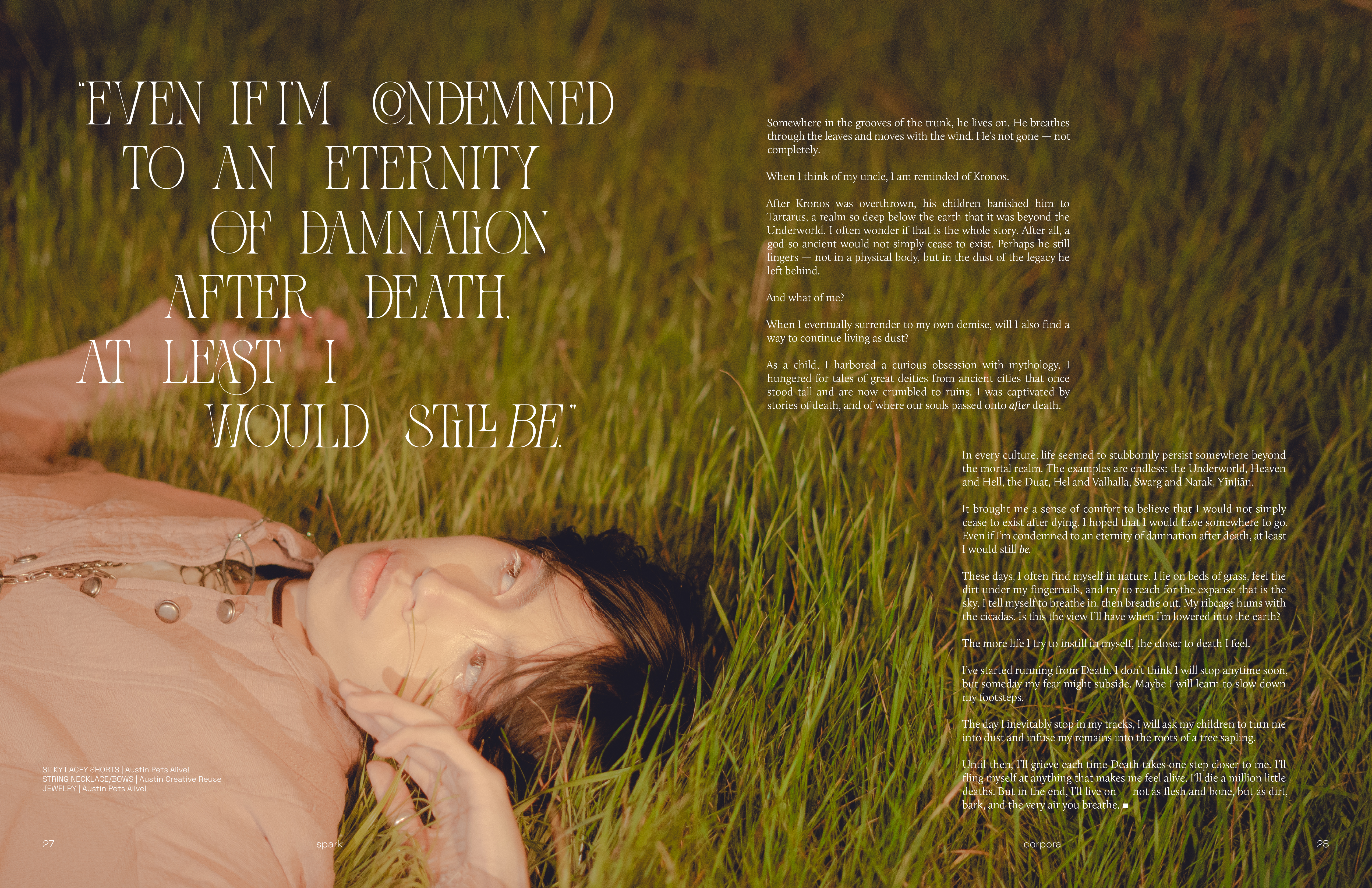
Even in death, we remain.
A Titan’s anatomy is strangely mortal. Their children are not.
Kronos’ godly offspring didn’t feel the burn of stomach acid when he swallowed them whole. When it came time, they clawed their way up his trachea to escape the prison that was his mouth, leaving his insides to bleed gold.
At least, that’s how I imagine it happened. As a child, my imagination ran too rampant to be constrained.
When I was around seven, my mind created this nightmare that came back to haunt me every other month.
It always started out in this oddly familiar restaurant. It was a dingy diner, the type I recognized from vintage American sitcoms. The entire place was dimly lit in a wash of putrid yellow lighting, and the booths and tables stretched on for as far as the eye could see, aligned in perfect geometric sequences.
No matter where I looked, the same weary rows of vintage diner booth seats and worn down floors stared back at me, unchanged for miles. There was no visible entrance or exit to be found. It sparked a feeling of unease deep within my subconscious, and an overwhelming impulse would possess my legs, forcing them to run.
Then, a familiar voice would reach my ears. My uncle would materialize in a booth in front of me, beckoning me closer. Something sinister seemed to simmer beneath his smile.
He wasn’t my real uncle.
Before my body allowed myself to flee, I would shrink to the size of a pill. My uncle, now looming over me, would pick me up by the collar of my shirt and swallow me whole.
The journey down his throat engulfed me in endless darkness. Just like that maze of a diner, there was no way out. My attempts to crawl back out were futile.
Then, a panic would seize me by the neck. My panic was alive, living inside of me, colonizing my organs like a parasite. It had a mind of its own, and grew to block my nostrils so that I couldn’t breathe. It killed me gradually from the inside, leaving me to wilt to nothingness in the abyss of my uncle’s stomach.
Then came rebirth.
A blinding light would burst from behind my eyelids to offer me salvation. Somehow, I’d reawaken in one of the booths at the diner.
I greet the familiar sight of sickly yellow lights and maze-like tables and chairs yet again. Sitting opposite of me is someone who’s not quite my uncle.
I stopped trying to run the second time around.
I always found the nightmare to be strange, because my uncle had always been nothing but kind to me.
My uncle wasn’t a bad man, but I knew he was no saint either. He shrouded himself in a haze of short-term happiness, the smoke of Marlboro cigarettes blinding his world.
He was always trying something new, always seeking the next thrill. While others existed, he lived.
Life was a test of endurance, but he bolted from the start. He didn’t care much for consequences. He thought if he ran from them fast enough, they wouldn’t catch up to him. And they didn’t — at least not for a while. But you tire with age, and he set himself up to lose the marathon.
His passing was a shock to the entire family. The hospital told us his cause of death was kidney failure. We knew he hadn’t been doing well, but no one thought he would leave us so soon.
Death had always seemed so far away from me. The day my mother heard the news of my uncle’s passing was the first time Death graced me with its presence. I saw it sneak through the cracks of my apartment’s front door and felt its chilling touch trace the surface of my skin.
That day, Death came one step closer to me and painfully reminded me of my mortal limits. Someday, it will claim my parents. Eventually, it will take my friends. I pray it comes for me before my sister.
After my mother returned from my uncle’s funeral, she sat me down at the dinner table.
“Your dad and I are not going to be around forever,” she said, eyes bloodshot. “You’ll need to know a few things. For when I’m gone.”
We tried to cover everything: life insurance, bank accounts, burial arrangements, how my sister and I would split their belongings. While she looked at a spreadsheet, my eyes were fixed on her. I wanted to commit every inch of her face to memory: every gray hair, every smile line, and every crinkle in the corner of her eyes.
Don’t give me your legacy, I almost told her. I’m not ready for it just yet. You won’t be going anywhere anytime soon. I have been mourning you since I was six years old, but I can’t imagine a life without your presence in my home.
Instead, I nodded as we went over numbers and technicalities. I stomached the pleas, and killed the beggar in me.
After my uncle’s funeral, my family sent his body to the flames. He came back as ash and splintered bone.
They returned him to the earth. My cousins scattered pieces of him into the dirt, mixed with the roots of a tree sapling. Today, his limbs stretch towards the sky in tree branches. He grows taller every year, towering over me still, just like he did in my nightmare.
Somewhere in the grooves of the trunk, I think he lives on. He breathes through the leaves and moves with the wind. He’s not gone — not completely.
When I think of my uncle, I am reminded of Kronos.
After Kronos was overthrown, his children banished him to Tartarus, a realm so deep under the earth it was beyond the Underworld. I often wondered if that was all there was to his story. After all, a god so ancient would not simply cease to exist. Perhaps he still lingers — not in a physical body, but in the dust of the legacy he left behind.
And what of me?
When I eventually surrender to my own demise, will I also find a way to continue living as dust?
As a child, I harbored a curious obsession with mythology. I hungered for tales of great deities from ancient cities that once stood tall and are now crumbled to ruins. I was captivated by stories of death, and of where our souls passed onto after death.
In every culture, life seemed to stubbornly persist somewhere beyond the mortal realm. The examples are endless: the underworld, heaven and hell, the Duat, Hel and Valhalla, Swarg and Narak, YīnJiān.
It brought me a sense of comfort to believe that I would not simply cease to exist after dying. I hoped that I would have somewhere to go. Even if I’m condemned to an eternity of damnation after death, at least I would still be.
These days, I often find myself in nature. I lie on beds of grass, feel the dirt under my fingernails, and try to reach for the expanse that is the sky. I tell myself to breathe in, then breathe out. My ribcage hums with the cicadas. Is this the view I’ll have when I’m lowered into the earth?
The more life I try to instill in myself, the closer to death I feel.
I’ve started running from Death. I don’t think I will stop anytime soon, but someday my fear might subside. Maybe I will learn to slow down my footsteps.
The day I inevitably stop in my tracks, I will ask my children to turn me into dust and infuse my remains into the roots of a tree sapling.
Until then, I’ll grieve each time Death takes one step closer to me. I’ll fling myself at anything that makes me feel alive. I’ll die a million little deaths. But in the end, I’ll live on — not as flesh and bone, but as dirt, bark, and the very air you breathe. ■
Layout: Andy Kang
Photographer: Juju Gonzalez
Videographer: Jose Velazco
Stylists: Aidan Vu & Grecia Del Bosque
HMUA: Angelynn Rivera & Averie Wang
Models: Aidan Vu, Odelia Schiller, & Aidan Christensen
Other Stories in Corpora
Your Body, in Two Pieces on the Highway
By Sunshine Zéa Leeuwon
May 3, 2025




The road doesn’t remember. The cars don’t slow. The highway swallows everything — blood, fur, bones — until only memory remains.
Death reaches his cold, spindly hands into my chest and says, I’m going to rip this away from you.
There is no warning. No negotiation. Just the taking. The brutal, indifferent severance of one thing from another — life from body, warmth
from skin, before from after. Death doesn’t wait for us to be ready. It doesn’t ask if we can bear it. It simply takes.
Once, on a road trip, I passed by twenty-three dead raccoons on the highway. I didn’t mean to count. It wasn’t a morbid game or a compulsive tic. But the number stacked up anyway, pressing itself into my brain like tire treads into asphalt. One. Two. Three. I tracked them the way I track time, the way I keep tally of the things I’ve lost but can’t quite name.
Some of them were still fresh, tangible as bodies rather than just outlines. Fur caught in the wind like it might lift from the ground and start running again. Blood that hadn’t yet sunk into the road, pooling in the crevices where the pavement split. Others had already started to fade, breaking down into something less distinct. Scattered bones, patches of matted fur, the slow, inevitable erasure of what they had been. I didn’t stop.
I could have. I could have pulled over, stepped out, walked back to kneel beside them. I could have reached out, pressed a hand against their little bodies, checked for the impossible warmth of something still alive. But I didn’t. Because I knew the truth before I even passed them.
They were gone, and it would hurt too much to hold that knowledge in my hands. So I drove on. As if distance could put space between me and the weight of knowing. As if sadness and remorse were enough of a payment. They’re not. They never are.
I have been both the driver and body left behind.
I have been the corpse on the asphalt, waiting for someone to notice. Waiting for someone to stop.
I was eleven when my father got sick. I watched the slow unraveling of a body that had once carried me, lifted me onto shoulders to see fireworks, held my hand in parking lots so I wouldn’t suddenly drift away. The hospital had smelled sterile and cold, a place where time stretched and folded, where minutes felt like hours and entire nights vanished into the air like smoke.
People would move swiftly past us in the hallway, eyes flicking away. It wasn’t their grief to hold. They had their own heaviness waiting for them somewhere else.
When it finally ended, I did what I had always done. I drove past it. I packed my days full of movement, filled the empty spaces with work, with school, with anything but the knowing. I convinced myself that forward was the only direction. That if I kept going fast enough, I could outrun the thing pressing against my chest, the monster curling around my ribs like vines in the dark.
But the thing about loss is that it waits. It lingers in the rearview mirror, growing smaller but very truly disappearing. I think about those raccoons sometimes, the way I think about all the things I’ve let slip by, the moments I let dissolve into distance because facing them felt impossible. The words left unsaid, the hands I never reached for, the faces I let blur into memory before I had the courage to really see them.
I have been the one who kept moving when I should have stopped.
There’s something about roadkill that guts me every time, more than that of merely seeing the corpse. The way a body lays broken on the asphalt, fur split like fabric, blood pooling in delicate shadows beneath. The way eyes, glazed and empty, stare at nothing. They don’t close. No one closes them. The world keeps moving, cars rushing past in a blur, indifferent to the ruin beneath their wheels. And that’s what makes it worse. Not just the death itself, but the way it goes unnoticed. The way something can exist one moment, whole and alive, and be discarded the next, flattened into the pavement like it was never here at all.
It isn’t just animals. It’s everything. The way people move past wrecks on the road, their eyes skimming over the twisted metal, the shattered glass, the dark stains spreading across concrete. The way we glance away from the man huddled on the street corner, the woman with the cardboard sign at the stoplight. We don’t want to look too long. We don’t want to carry that knowing, because knowing comes with burden, and burden is a leaden weight.
Still, I see my own reflection in every broken thing. That’s why it lingers for me. Why the image of each body stays burned into my memory long after I’ve left them behind. They are proof of something I don’t want to name. They remind me that everything I love is fragile, that it only takes one mistake — one misstep, one wrong moment — for it all to be gone.
When I drive, my eyes instinctively scan every trash bag and shredded tire along the highway, searching for their small, broken bodies — desperate to make myself bear witness.
A deer, crumpled on the shoulder of the road, its legs twisted at impossible angles, ribs caved in like something hollowed it out. A fox, fur still bright and red, but insides spilled across the road like an opened fruit. A bird, wings outstretched as if caught mid-flight. A cat, curled as if it had only meant to sleep. A dog, its collar still on, its owner waiting somewhere, wondering why it never came home.
I imagine being that animal on the road, having that one awful second of realization before impact. In that final, swift moment, knowing that there was no escape.
But even when death is quick, its weight is slow. It presses into the places we don’t expect, filling the quiet moments between heartbeats, lurking in the spaces where something should be but isn’t. I feel it in the silence of an empty house, in the hush before sleep, in the memory of laughter that doesn’t belong to this moment. Loss is never just a singular event — it is a tide, dragging and relentless, breaking us down grain by grain in an unending war.
Desperate, I tell myself that grief is a form of currency. That my sadness, my guilt, my inability to let go, somehow balances the scale. That if I feel the weight of it enough, it counts for something. But it doesn’t. The road doesn’t remember. The cars don’t slow. The highway swallows everything, blood and fur and bones, until there is no evidence left. Until the world goes on exactly as it did before.
But, regardless, I carry it with me. The sight. The grief. I dream about it sometimes. Not about death itself, but the aftermath. The stillness. The feeling of being unrecognizable. In the dream, I’m standing in the middle of the highway. There is no sound except for the wind, and the low, far-off hum of something coming. I look down, and there I am. Not standing, not whole, just pieces. I try to move, to speak, but I am merely what that once was. And the cars don’t stop.
I recall those raccoons. Those other little bodies I’ve seen on the road. The deer. The fox. The bird. The cat. The dog. I tell myself I must remember, because memory is the only monument for the forgotten. Or else they’re just gone. Nothing but bones and asphalt. Nothing but emptiness. Nothing at all.
But absence is never truly empty. The weight of what is gone still presses into the world, shaping it, haunting it, making it heavier in ways we don’t always see. Maybe someone else, driving down some stretch of highway, will see what I saw. They’ll count too. They’ll feel the same ache, the same knowing that some things are too fragile for the speed at which we move.
This is the deal we make every time humanity moves through the world. We will take, and we will lose. We will keep driving, because we have to. Because stopping won’t change anything. Because grief is a weight that never settles, only shifts.
But the things we’ve lost remain. Flattened into the road, waiting for someone to notice. Waiting for someone to remember.
And I will. I always will. ■
Layout: Gray Suh
Photographer: Juju Gonzalez
Videographer: Paisley Bales
Stylists: Sophia Manollo-Sudaria & Mimo Gorman
HMUA: Abby Bagepally
Models: Grecia del Bosque & Elaine Gong
Other Stories in Corpora
Tooth Decay
By Victoria Kayode
May 3, 2025


Closed mouths get cavities; open ones get drilled.
X-ray images are taken of the inside of my mouth. Each black-and-white capture reveals the depth of the cavern forming between two teeth too far back for me to know them well.
“Let’s schedule your appointment for a filling,” says the hygienist.
Nodding, I glide the tip of my curious tongue toward the site of decay. It reaches between grooves in the dark recesses of my mouth and touches bone and memory. A brief investigation reveals the cause: neglect and sugary sweet words uttered to placate those around me. Sparing them the potentially bitter truths I wished to share had led to overindulgence. Knocking on my incisors, chipping them away, the acidity of my words rises like bile from my belly. Lockjaw dams their flow, so they swish, swish around. Each word crashes against off-white walls, etching my sentiments on my gums. Their syllables erode my enamel when I don’t speak.
…
Speaking was never my preferred mode of communication. I tended to hold my most intimate thoughts in diaries. Their ink lines cradled my words and restrained my inner voice to the blank space behind them, binding them between hard covers.
A transformation began when summer’s cotton-candied sunsets replaced the fluorescent lights of my sixth-grade halls. That’s when I met a rowdy group of middle schoolers at a forensic science camp. I admired them all for confidently projecting half-formed thoughts and jokes whenever they saw fit. Because I never chose to speak first, they prompted my speech with questions. My voice began to croak out of me, though it never took up much space. Wielding this instrument was uncomfortable at first. It was as though I’d abandoned it to rust in a dark corner of my room and with it my ability to play. I was worried I’d play off-key. However, I realized I had a gracious audience waiting to give their applause when I tested it out.
…
As a natural introvert, that summer camp was a fearful leap into the deep end. Maintaining my silence was a choice I enjoyed, but my friends made speaking feel good. Eventually, the warm summer air that charged my transformation became a shocking cold to my skin.
One day in high school gym class, someone disturbed the rhythm of my walk by flinging the n-word against my ear. This word penetrated the race-neutral atmosphere surrounding me; I became hyper-aware of the singleness of my Black body amidst the plurality of white bodies.
The White friend of the White guy who so casually let this fourth person intrude into our three-person conversation gave him a look that said, “She’s right there!”
“She knows I say it,” the offender hissed with his forked tongue.
Confused by where he believed I came to “know” he said “it”, I kept my mouth shut and tasted the bitter reality resting on my palette. My mind stayed fixed on that moment as my feet carried me forward.
Through some insidious process that started long before this chilling realization, I’d become more than a girl; I became a Black girl. It’s not that I’d never stood before a mirror or noticed my darkness against the lightness of my surroundings, but I’d never been confronted with such unapologetic ignorance. I’d expertly played the role of the easygoing girl. But what did my lack of verbal response say to them? What did it mean for me?
…
Caries develop as acids form from accumulated bacteria. The vicious attack on the tooth’s surface creates a small hole, a cavity. There are five main stages of tooth decay, each marking greater damage to the tooth: demineralization, enamel decay, dentin decay, pulp damage, and abscessed tooth decay.
The white spot decrying the mineral breakdown of my enamel at stage one deepened to a light brown by the time I saw the hygienist. Living out of state, I hadn’t made it a priority to find a dentist in Austin. This winter break made almost two years since my last check-up. The two cavities discovered told me I’d been naive to think I was fine. In truth, all my brushing and flossing had been insufficient.
…
Forever molded by that experience, my mind, body, and tongue hoped to spare my ears, heart, and soul from vulnerability and pain. However, my conscience demanded liberation. An opportunity for this came in the summer of 2020, with Black Lives Matter protests at their peak. My theatre teacher and mentor approached me and two other Black peers with a proposal.
“I think you guys should create something. I’d love to help if you want,” she said.
We accepted her offer. Over the following weeks, we met with other BIPOC artists. These artists would say things like, “My school is mostly white,” “I’m one of the only POC students,” and “I don’t feel like I belong.” We were struggling with the tension between our racial identities and a racist environment. In response, we created pieces reflecting our experiences as artists of color in a world offended by our pigment. My spoken word piece “All Black is Black” traced the contours of Blackness, expressing the richness and diversity of the Black community as I saw it.
Eventually, my teacher asked, “What do you want to do with these pieces?”
Someone suggested, “We should create a website!”
After brainstorming the who, what, and why of the website, fear strangled my excitement. I took pride in my piece and what we hoped to do but was afraid of speaking out. In my head, the slur that once hit me like a dodgeball was whipping through the air again. When I confided in a loved one, I was told it was “smart” not to publicly speak on what was happening.
Our output never made it online. I felt disappointment and relief — I wasn’t ready to be heard. Some applauded the effort, while others sighed at its breakdown. I chewed on both sentiments, feeling pricks of self-doubt on the cushion of my tongue.
…
There are five common methods used to treat the cavities caused by each stage of decay: fluoride treatments, fillings, crowns, root canals, and tooth removal. The appropriate treatment depends on the severity of the decay, with root canals and removal being the most invasive. However, if caught early enough, the tooth decay can be reversed.
Without treatment, infection can occur. This results in a pocket of puss forming at the tip of your tooth’s root. The pain from this periapical abscess can plague your jaw and induce swelling of your lymph nodes and face. The abscess can go so far as to spread to surrounding tissues and other parts of your body. At its worst, the infection can infiltrate your brain and bloodstream, causing sepsis.
…
Last spring, I attended my first of many protests, but they’ve muddled into one. The heavy clunk of hooves and the trail of dung leading directly to a shit show echo in my memory. The synchronicity of a choir of outraged voices shouting “OFF OUR CAMPUS!” rings incessantly. Even now, my lips parse — they are puppeteered to remember.
My anger exploded. My voice was the sound of alarms.
BANG! The sound of a gun? Screams. Crying. It was tear gas. I grabbed my friend’s hand and ran. Overgrown hedges were underfoot. Pepper spray forced fellow soldiers, peers, kids to their knees. My campus was a war zone. I smelled the heat rising from the sidewalk. We all reached for the sky alongside it.
My anger was fueled by compassion. My voice was an extended hand, “Do you need help?! Water?”
Unlike before, I let every shade of my frustration, every lash of my tongue, every vocal projection expose my feelings. The stakes had always been high, but I’d finally realized I needed to pull myself higher. I’d learned to bark and bite.
…
For a direct filling, the dentist numbs the area with local anesthesia before drilling out the decay. The high-speed friction of metal on bone wears away all evidence of the breakdown that occurred. With the hole widened, the dentist fills the cavern with healthy bone amalgam, resin composite, or glass ionomer. This is followed by polishing and smoothing any roughness, then a quick bite check to ensure a proper fit.
Sensitivity and soreness are expected, but it’s temporary. It goes away.
…
For so long, I thought closing my mouth would keep me safe. Letting these words lie between my teeth was damaging. The only way to expel this narrative was to pry my teeth apart. It was uncomfortable, but the sensation was temporary. It went away.
I keep opening my mouth to show the world what I’ve been chewing on. It seems the quiet girl I knew is gone — this is how I brush my teeth. ■
Layout: Adriana Ramirez
Photographer: William Whitworth
Stylists: Paisley Bales & Juan Gutierrez Vega
HMUA: Grace Joh & Floriana Hool
Nail Artist: Grace Joh
Models: Kaimana Carlsward & Victoria Hales
Other Stories in Corpora
© 2025 SPARK. All Rights Reserved.
